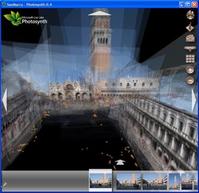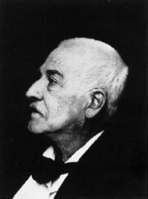| Thursday, June 14, 2007 |
| Photosynth |
 Wow, indeed. This video from TED. Mindblowing technology. I don't get how it is possible, but I want it. Photosynth can apparently both navigate gigabytes of photos, of any resolution, extremely rapidly, and also piece together random photos of places or objects into 3D collages. For the first part, the guy shows an iPhoto kind of thing, where you can zip through thousands of pictures, but you can also zoom in to any level of detail, if available. So, you see what looks like a microfilm, and you can zoom in, and it is a whole book, you can read the pages, and all the way to a blowup of a single letter. And then he shows a collage of photos from Flickr tagged as being of "Notre Dame" in Paris. And their software can apparently figure out their relations, and piece them together in a 3D model, where you can zoom in on any part that anybody took a picture of. Only downside in sight is that Microsoft bought the company that invented this. I noticed there was a Firefox plugin, but it immediately let me know that it would only work on Windows. (Via Ben Hammersley) Wow, indeed. This video from TED. Mindblowing technology. I don't get how it is possible, but I want it. Photosynth can apparently both navigate gigabytes of photos, of any resolution, extremely rapidly, and also piece together random photos of places or objects into 3D collages. For the first part, the guy shows an iPhoto kind of thing, where you can zip through thousands of pictures, but you can also zoom in to any level of detail, if available. So, you see what looks like a microfilm, and you can zoom in, and it is a whole book, you can read the pages, and all the way to a blowup of a single letter. And then he shows a collage of photos from Flickr tagged as being of "Notre Dame" in Paris. And their software can apparently figure out their relations, and piece them together in a 3D model, where you can zoom in on any part that anybody took a picture of. Only downside in sight is that Microsoft bought the company that invented this. I noticed there was a Firefox plugin, but it immediately let me know that it would only work on Windows. (Via Ben Hammersley)[ Technology | 2007-06-14 01:00 | 2 comments | PermaLink ] More > |
| The Pmarca Guide to Personal Productivity |
 Oh, this is just brilliant. This article. I had read it all the way through before I realized the author is Marc Andreessen, the guy who invented Mosaic, essentially the first web browser. This is, as he calls it, Productivity Porn. A lot of people, myself included, are addicted to new systems of staying organized and productive. Getting Things Done (GTD) by David Allen has been the most popular angle recently, and so far the best system I've run into. But then again, I haven't completely succeeded in making it work for me, even though I agree with it. And, now, this system is not incompatible with GTD, but it goes some steps further in simplifying things, and addressing that which makes people productive. At least people like me, who do the best work when I don't have to, and get stuck when I've got too many commitments and deadlines and meetings. So, a key new principle here is: Oh, this is just brilliant. This article. I had read it all the way through before I realized the author is Marc Andreessen, the guy who invented Mosaic, essentially the first web browser. This is, as he calls it, Productivity Porn. A lot of people, myself included, are addicted to new systems of staying organized and productive. Getting Things Done (GTD) by David Allen has been the most popular angle recently, and so far the best system I've run into. But then again, I haven't completely succeeded in making it work for me, even though I agree with it. And, now, this system is not incompatible with GTD, but it goes some steps further in simplifying things, and addressing that which makes people productive. At least people like me, who do the best work when I don't have to, and get stuck when I've got too many commitments and deadlines and meetings. So, a key new principle here is:
don't keep a schedule Don't keep a schedule at all. Don't schedule meetings for next week. He's quite right, that often a meeting scheduled in the future is a way of avoiding the fact that it is not very important to you right now. Or, at best, when next Tuesday at 3 o'clock comes along, even if the subject maybe interests you, most likely there's something else you'd rather be doing at that exact time. So, don't give away your future time. Always work on what is most important to you. If somebody needs to see you, either see them right now, or tell them you can't commit to anything, and you don't keep a schedule. Andreessen didn't altogether invent this. He seems to be inspired in part by the book A Perfect Mess, which presents that idea, that it is more productive to not have a schedule, and which gives examples of well-known people, like Arnold Schwarzenegger, who supposedly organize themselves like that. He gives other great suggestions. Like, every night write down, on a 3x5 card, a todo list of 3 to 5 things you for sure need to do the next day. Then, the next day, do your best to get those things done, and cross them off when you've done them. And, on the back of the same card, write down an anti-todo list, which are the things you get done during the day that weren't on your actual todo list. And, at the end of the day, enjoy the fact that there probably are many more items on the anti-todo list, and that actually you were more productive when you weren't supposed to. And then there's the related Structured Procrastination approach. I recognize that very well, because I do that often. Deliberately procrastinate some things you need to do, but which you don't feel like, and use that time to get some other things done that you feel more like. Which is indeed what I'm doing now. I have lots of work to do today, which I don't feel like doing, and I wouldn't be writing this post if I only followed my todo list. There are more suggestions, but you can read them yourself. But basically it adds up to organizing your life so that you can do the things that are most important to you, the things you love doing, the things that seem most valuable at the time. As opposed to a list of "shoulds" that don't do much for you. It is cool that we're beginning to have technological tools that make that more possible. You know, you can better do impromptu meetings when everybody have cellphones. Or you can do it online. It is easy to know when a small group of people are available at the same time, even if nothing was scheduled. It is actually often easier than scheduling anything. And in ad-hoc self-organization within networks there are potentials that don't exist in strictly organized, scheduled, hierarchical systems. It is entirely possible that you can do what you love most of the time, and that at the same time collective intelligence emerges in your network. It just can't be planned in advance. (Thanks to Loic for mentioning it) [ Organization | 2007-06-14 13:28 | 3 comments | PermaLink ] More > |
| Denial of complexity |
 What a great quote! Burkhardt was a Swiss social historian from the 19th century. He is credited with discovering (identifying) the age of the Renaissance. And for that matter also with the basic idea of being able to study and describe different periods as a whole, including culture, institutions, daily life, etc. Life is complex, biologically, socially, culturally. The most awesome stuff that exists is complex. The universe, evolution, eco-systems, art, adventure, human culture in general, and the human mind. That same human mind is at a crucial point in its evolution. We can consciously think abstractly. But not very well. The part of our mind we're conscious of, and that we usually identify with as "me", typically has an extremely inflated idea of its own worth and its own independent existence. That despite that it can only solve extremely simple problems, and it doesn't even know how. It over-simplifies everything, and it tends to think it is in charge. That simple mind is also the wonderous faculty for paying attention and appreciating life, and for consciously discovering the mysteries of the universe and of human existence. But when the simple mind gets stuck in the idea that it is in charge, and one of those simple minds end up commanding armies of millions of men, and huge economies, guiding the lives of billions, we're quite a bit in trouble. When the simple mind doesn't accept the complexity that brought it about, and it actually believes that its simple ideas are facts, and it tries to act accordingly, then we're in a lot of trouble. Yes, tyranny is when powerful rulers decide that the complexity simply is unacceptable, and it tries to control it, deny it, wipe it out. When a small group of people agree on a small list of small ideas as being the correct ones, validated by nothing much more than the voices in their heads, life is in danger. Doesn't matter much if their ideas are religious or moral or economical or political. It is the denial of the fundamental complexity of things that turns it into tyranny. What saves us is often that those simple minds make many mistakes and miscalculations, so eventually their schemes fall apart. But it might take a while, and it is hard to predict what they take with them on the way down. It hopefully sorts itself out in time, before it is too late. As the world becomes more complex, it gets harder to control big chunks of it without some understanding of complexity. One can still win in the short term by strategies of denying complexity, by forcing life into simple monocultural molds. But complexity has a life of its own, and there will inevitably be a certain evolutionary natural selection that takes place. The stuff that works will outcompete the stuff that doesn't work, given enough time. And that in itself is reason for limitless optimism. Simple, rigid structures are subject to entropy. They fall apart over time, turn to dust. Wheras complexity, of the type that life is made of, regenerates, re-configures itself, it evolves, it transitions to higher orders of organization. I think I'm gonna place my bets on life. [ Organization | 2007-06-14 13:47 | 7 comments | PermaLink ] More > |